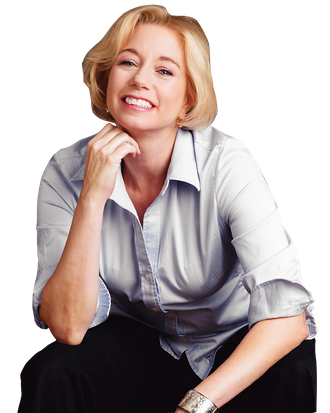

Fans of Laura Lippman love each of her two literary specialties: the Tess Monaghan detective series as well as Lippman’s acclaimed “stand-alone” novels, character-rich meditations on childhood guilt, many of them based on real-life crimes. The latest of these is The Most Dangerous Thing, which takes place in Dickeyville, the suburb of Baltimore where Lippman herself grew up. The central mystery occurs in the seventies, a free-wheeling era that comes across as at once idyllic and terrifying, back when children were allowed to run wild. If there’s a greater emphasis on the perils of being a parent, that makes sense: partway through her writing of the book, Lippman and her husband, David Simon (the creator of The Wire and Treme), became the parents of a daughter. We spoke with Lippman about crime novels’ inherent conservatism, parental anxiety, and adorable Mardi Gras costumes.
Your book brought back so many memories of playing alone in the woods as a child, which is something my kids can’t do here in Brooklyn.
You’re almost the last generation of people who were allowed to do that.
I’m 45.
I’m 52. But you’re the same age as the people in the book. And this really is a lost world! My stepson, who is 17, grew up in a very safe suburb. His house backs up to the elementary school, but he didn’t have this kind of freedom, ever.
Did you play this way?
Very much so. I didn’t have a coed group of friends, but I played with two younger girls. So when Gwen and Mickey first meet in the book, that’s what it was like for me and my friends. We were always pretending to be door mice or unicorns, gathering nuts and berries.
I know you’ve said the book changed to some degree when you became a parent.
Yes, David and I have a daughter now. She’s 15 months old. And it really changed how I thought about parents. You know, I thought I knew a lot, because I’ve had a stepson for so long, which is the best of all possible worlds. You get to enjoy this glorious kid, but the most hard-core responsibility I had was getting him places. Minor league safety concerns: Should he ride his bike through the French Quarter? It’s very different to have this kid that I’m truly responsible for.
Before having a kid of my own, I would have been much more coldhearted, I would have seen parents like Tally and Rita as being unforgivably self-centered. But I thought … it’s hard, you know? I’ve become a parent at such a late stage that I’ve gotten to do a lot of stuff, traveled, worked hard at my career. I’m at the age most people are sending their kids off to college. I’m not envious of that — I just did it in a different order — but having a child, it was easier for me to see how frustrated a woman might be to have to choose one path over another.
I don’t know if you’ve followed this horrible case in Brooklyn, where the kid was murdered. It terrified all the parents I know.
Oh my God, oh my God. Yes, I have paid attention to that. But I’ll tell you what made a more profound impact on me was Lisa Belkin’s Motherlode blog, where she ran a piece about a drowning in Nantucket, about the writer imagining for a moment that the kid had been her own kid’s age. And I knew that when I’d go into the comments, someone would say, “What we really should be talking about is that all drownings are preventable.”
Noooo! No. I understand the impulse: People want to believe they have this immense amount of control. That everything is an object lesson. But someone asked me recently, “What is the theme of your work in general?” And I said, “In general, what I’m trying to tell people is that anything can happen to anyone at any moment.” It’s human to try to shout that down, to look for the detail that says, “That couldn’t happen to me … because.” Over the weekend, some people I’m close to experienced an unbelievable tragedy, two of their friends were trying to walk home in the hurricane and they both drowned. They were in their twenties. And you know, I never think, That would never happen to [Lippman’s stepson] Ethan … because. We were sitting and thinking, This could be us.
That was the big change for me, the constant worry that something bad might happen to my kids, these recurrent anxieties. I guess this has nothing to do with your book.
Well, it really does! I mean, what do you do when you have a morbid imagination? I’ve forced it into fiction and that’s cathartic for me. It creates greater lightness in my day-to-day life. But so many people said to me, “You won’t be able to write the same way now.” And it is true in some ways. For instance, I found out about this case in Australia that involved a child with an unusual disability; the child drowned in a backyard pool not long after the parents made inquiries about whether they could relinquish child care to the state, and they were turned down. But as I was researching the disability, I read that it affected girls between 6 months and 2 years old. And I thought, I’m not writing that book until my daughter is 2 years old. It felt like bad karma.
I enjoyed the post on your blog the Memory Project about your frustration at reviews that praise crime writers for “transcending the genre.” Why does that bother you?
Because it suggests that genre in and of itself is a limitation. And then you can’t win. I guess I feel that with all genre novels — and crime is treated the best out of all of them — but basically, at the moment that any genre book is deemed a literary success, it’s like the cutest kid in the orphanage. Suddenly Daddy Warbucks arrives and takes it by the hand. Now you’re an heiress! We’re going to anoint you as literary fiction. You’re not genre fiction because you’re really good.
You know, I don’t see Richard Price as a crime novelist; it’s not what he’s starting from. I am: I’m a crime novelist. It’s not that I make any great claims for my own work, that people have to like my books in particular. But I feel like, while I might be limited, I don’t think the form is. And it’s a vicious circle, because when certain crime writers start to be taken seriously, one of the big literary critics will always come along and they’ll beat them down with their own miscomprehension about what the genre is about. They’ll say, “It’s a formula in which everything ends neatly.” Really? If you say that, you’re not reading crime fiction broadly.
I think I’m part of a generation of crime writers all of whom woke up independently and recoiled with horror at the fact that we’d chosen this very conservative genre. That we ourselves were very liberal in our politics, almost lefty — but the crime novel is conservative as traditionally practiced. It suggests that the status quo is worth restoring. And I think, my generation of writers, we believe that the order is never truly restored. That what happens with any crime is that a placid exterior is disrupted. The ugliness beneath is seen, whether it’s about class or race or domestic violence; something really ugly is uncovered.
And while it may be somewhat papered over by the end of the novel — justice has been done — the knowledge that it was never really nice is always there. Crime novels now are very much about being expelled from Eden. You don’t go back. I don’t want to read the crime novel where the whole point is that twenty prostitutes were murdered, but the cop who solved that goes home to hug his daughter. Twenty women are dead! I want to read about them.
What’s going on with all of your books that have been optioned?
Let’s see. The Tess Monaghan books: A pilot is being written for TNT. That’s happening right now. Then it’s about, do they film the pilot? Do they take it up for series? It’s being written by Jay Cocks, who wrote Gangs of New York and was a longtime film critic: great guy, really smart, couldn’t be in better hands. The script for Every Secret Thing was written by Nicole Holofcener, who was going to direct and decided to recuse herself — in part, I hear, because she found the material too dark. But that is under option to Frances McDormand as a producer and I have utter faith in her, that she’ll get it made. I’d Know You Anywhere, there’s a deal being made, but I don’t even know what’s going on. I think it’s for television. I try not to get involved, because I don’t know how to do this.
Has David given you any advice on the television development?
You know, I don’t think I’ve asked him for any advice. I think it’s nice for David to be married to someone who gets that the work he does is very hard — much harder than what I do. I do remember one time we were talking about the option for Every Secret Thing. And David said, “It could be a film. It could be a film, I can see it.” And then he paused and said: “They won’t let [the main character] Nancy be fat.” [Laughs.]
I loved the chapter in your book when one of the little kids dresses up for a parade. It’s such a fun part of having a little kid, getting to dress them up for Halloween.
Well, we’ll have a very hard time surpassing our daughter’s Mardi Gras costume.
What was she?
A Hubig’s Sweet Potato Pie. And we had the Hubig’s label silk-screened onto a pillow sheet and these little orange and yellow leggings.
Did you guys dress up, too?
Her dad dressed up as Savory Simon, which is the name of the baker on the Hubig’s pie. And I was a human King Cake; I had a T-shirt that had the king cake, and I had a tutu on, with little plastic babies sewn on to the hem. We entered Mardi Gras wholeheartedly. We didn’t hold back.
Lippman will be reading from The Most Dangerous Thing at the Barnes & Noble on East 86th Street tonight (August 31) at 7 p.m.

